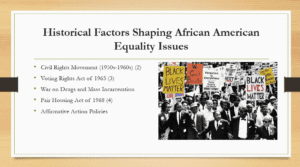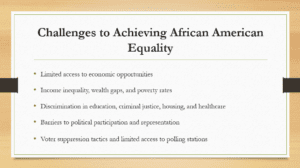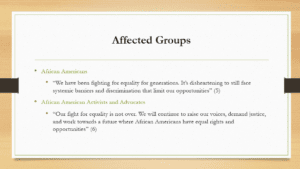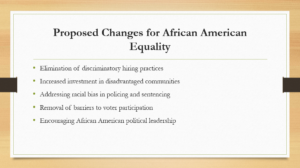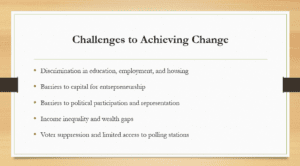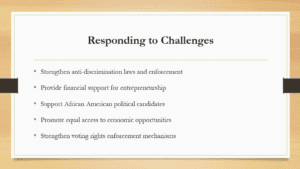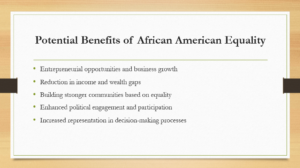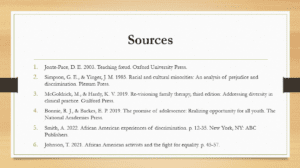African American Equality Issues in the US
Get in touch with us at eminencepapers.com for any assistance.
Hello everyone, and welcome to today’s presentation on African-American Equality in the United States initiated by Mercy Medical Center.
Here is an outline of the presentation. We Will begin by describing and understanding the historical factors shaping African American equality issues. We will then look at the challenges to achieving African-American equality. To follow this, we will look at the affected groups. Next, we will discuss challenges to achieving change and the response to these challenges. We will then look at the potential benefits of African-American equality. Finally, we will look at some thought-provoking questions.
As we delve into this important topic, I want to start with a powerful quote by Martin Luther King Jr., who said, “Injustice anywhere is a threat to justice everywhere.” This quote highlights the interconnectedness of equality and justice, emphasizing that the fight for equality should be a collective endeavor (3). To set the stage for our discussion, let me pose a thought-provoking question: Is true equality for African Americans achievable in the United States? This question sparks reflection and encourages us to critically examine the progress we have made and the challenges that still lie ahead. Throughout this presentation, we will explore the challenges and benefits associated with achieving African-American equality in the United States. Our aim is to comprehensively understand the obstacles that hinder progress and the potential rewards that can be realized through proposed changes. Notably, by addressing economic disparities, institutional racism, and political underrepresentation, we can move closer to a future of equal opportunities and experiences for African Americans. This thesis will guide our exploration of the topic and provide a roadmap for our presentation.
The historical factors that have significantly shaped African American equality issues are crucial to understanding the current challenges. These factors have played a significant role in shaping the landscape of racial equality in the United States. First, the Civil Rights Movement (1950s-1960s) was a pivotal time in African American history, characterized by the fight against segregation and racial discrimination. Landmark events such as the Montgomery Bus Boycott, the March on Washington, and the passage of the Civil Rights Act of 1964 were instrumental in advocating for equal rights and justice (2). Second, the Voting Rights Act of 1965 was a landmark legislation that aimed to overcome barriers to African American voting rights. It addressed discriminatory practices such as literacy tests and poll taxes, ensuring political representation and participation for African Americans (3). Third, the war on Drugs and Mass Incarceration, initiated in the 1970s, disproportionately impacted African American communities. This approach contributed to the over-representation of Black Americans in the criminal justice system, exacerbating racial disparities and perpetuating inequality. Fourth, the Fair Housing Act of 1968 aimed to eliminate housing discrimination based on race. It sought to address racial segregation and provide African Americans equal access to housing opportunities (4). Lastly, affirmative Action policies were implemented to address historical disadvantages faced by African Americans and promote equal opportunities. However, these policies have been the subject of controversy and ongoing debates regarding their effectiveness and fairness. Understanding these historical factors is crucial as they provide context to the challenges African Americans have faced in their pursuit of equality. These events and policies have shaped the social, political, and economic landscape, highlighting the importance of continued efforts to address and overcome these issues.
Achieving African-American equality in the United States involves addressing several key challenges. The first challenge is economic disparities. African Americans have historically faced limited access to economic opportunities. Achieving African American equality in the United States is a complex task that requires us to confront and overcome several significant challenges. Limited access to economic opportunities has resulted in persistent income inequality, wealth gaps, and higher poverty rates. It is important to recognize that the cumulative effect of prior economic disadvantage makes it even more difficult for African Americans to achieve the same level of wealth as their White counterparts. The second challenge is institutional racism and discrimination. African Americans continue to experience discriminatory practices in various institutions, including education, criminal justice, housing, and healthcare. These systemic biases perpetuate inequality and hinder progress toward achieving equality for African Americans. Notably, the over-representation of Black Americans in the US justice system is a pressing issue that highlights the deep-seated racial disparities within society. The third challenge is political underrepresentation and voter suppression. African Americans have historically faced barriers to political participation and representation, limiting their ability to influence policy decisions and shape legislation that directly impacts their communities. Moreover, deliberate efforts to suppress their voting rights through tactics like voter suppression laws and limited access to polling stations further undermine their political empowerment and dilute their voices. Addressing these challenges is crucial to make significant strides toward African-American equality. By dismantling systemic barriers, implementing policies that promote economic equity, combating institutional racism, and ensuring equal political representation and voting rights, we can work towards a future where African Americans have equal opportunities and experiences. A more just and equitable society for all can only be built by acknowledging and actively addressing these challenges.
This slide highlights the perspectives of two key groups affected by the issue, including African Americans and African American activists and advocates. African Americans express their disappointment with the persistence of systemic barriers and discrimination that impede their progress. They highlight the ongoing struggle for equality that has spanned generations, emphasizing the frustration of facing obstacles that hinder their opportunities for success (5). On the other hand, African American activists and advocates are committed to the ongoing struggle for equality. They affirm their determination to raise their voices, demand justice, and work tirelessly toward a future where African Americans have equal rights and opportunities (6). Despite facing resistance and challenges, they remain resolute in their pursuit of dismantling systemic racism and creating a more inclusive society. These perspectives highlight the experiences, frustrations, and dedication of African Americans and their advocates in the ongoing fight for equality. By understanding their voices, we gain deeper insights into the urgency and importance of addressing African American equality issues.
To address the challenges African Americans face and move closer to achieving equality, it is crucial to propose tangible changes across various spheres. Economic disparities are one of the significant barriers to African-American equality. To address this, several changes are required. First, ensuring equal access to quality education and training opportunities will equip African Americans with the skills necessary for success in the workforce. Additionally, eliminating discriminatory hiring practices will level the playing field and provide equal employment opportunities. Finally, increased investment in disadvantaged communities, particularly in terms of accessible capital for entrepreneurship and infrastructure development, can create economic empowerment and stimulate growth. The criminal justice system is the other significant barrier to African-American equality. The criminal justice system has disproportionately impacted African American communities. To improve the situation, comprehensive criminal justice reform is needed. This includes addressing racial bias in policing and sentencing, implementing policies that promote alternatives to incarceration, and focusing on rehabilitation rather than punishment. Fair and equitable treatment within the justice system is crucial to ensure justice is served and that African Americans are not unfairly targeted or disproportionately affected. Political engagement and representation are the other significant barriers to African-American equality. Political engagement and representation play a pivotal role in achieving African-American equality. Proposed changes in this area include removing barriers to voter participation, such as restrictive voting laws, and ensuring equal access to polling stations. Encouraging African American political leadership at local, state, and national levels will provide a platform for addressing systemic issues and enacting meaningful change. Implementing campaign finance reforms will also contribute to more equitable representation and reduce the influence of money in politics.
The proposed changes in economic empowerment, criminal justice reform, and political engagement and representation offer pathways toward achieving African-American equality. These changes aim to address the root causes of inequality, promote fairness, and empower African Americans to participate fully in all aspects of society.
African Americans continue to face systemic discrimination in various institutions, including education, employment, and housing, limiting their access to quality opportunities and resources. African Americans often encounter challenges accessing financial resources and loans to start and grow businesses, hindering economic progress. African Americans have historically faced political participation and representation obstacles, limiting their influence on policy decisions and the ability to shape legislation. In addition, African Americans experience lower average incomes and wealth accumulation compared to their counterparts, leading to persistent disparities. Lastly, African Americans often face voter suppression tactics, such as discriminatory voter ID laws and limited access to polling stations, which undermine their political empowerment and dilute their voices.
This slide focuses on providing a brief, logical response to each of the challenges faced in achieving African-American equality. Firstly, to combat institutional racism and discrimination, it is crucial to strengthen anti-discrimination laws and enforcement. Promoting diversity and inclusion in institutions, reforming the criminal justice system to eliminate racial disparities, and providing cultural competency training to professionals in various sectors are logical responses to challenge discriminatory practices. These measures can help create a more equitable society where African Americans have equal access to essential services and fair treatment under the law. Secondly, promoting equal access to economic opportunities for African Americans is a logical response to address economic disparities among the affected groups. This can be achieved by increasing investment in disadvantaged communities, enhancing access to quality education and training, and providing financial support for entrepreneurship. By bridging the economic divide, African Americans can have equal access to opportunities, leading to improved socioeconomic outcomes. Third, to address political underrepresentation, promoting diverse representation is essential. This can be achieved through redistricting, campaign finance reforms, and increased support for African American political candidates. Additionally, implementing policies that expand access to the ballot, strengthening voting rights enforcement mechanisms, and educating communities about their rights can empower African American voters and counteract attempts to suppress their participation. Notably, implementing these logical responses is a step towards dismantling the barriers that hinder African-American equality. These efforts will contribute to creating a more inclusive, just, and prosperous society for all.
As we explore the potential benefits of achieving African-American equality, we can envision a future where everyone has equal opportunities and experiences. One of the significant benefits of African-American equality is the potential for economic growth and prosperity. By providing equal access to economic opportunities, we can harness the full potential of a diverse workforce. Increased workforce participation and productivity will contribute to overall economic growth. Moreover, fostering entrepreneurial opportunities and supporting business growth in African American communities can lead to a more equitable distribution of wealth. Closing income and wealth gaps will create a stronger and more inclusive economy. Achieving African American equality is not only essential for economic reasons but also for building a socially cohesive and harmonious society. Besides, promoting equality fosters a sense of inclusion and unity among individuals from different racial backgrounds. This inclusivity strengthens communities, breaks barriers, and encourages empathy and understanding. It lays the foundation for a society that values diversity and appreciates the contributions of all its members. A key aspect of achieving African-American equality is ensuring fair political representation and influence. As such, addressing barriers to political participation creates an environment where African Americans are empowered to engage in the political process. Increased political engagement leads to better representation in decision-making bodies, which, in turn, influences policy outcomes. Policies crafted with diverse perspectives and experiences can better address systemic inequalities and promote justice for all. The benefits of African-American equality extend beyond the individual and community well-being. They encompass economic growth, social cohesion, and political empowerment. Thus, working towards this change creates a more prosperous, harmonious, and just society.
This slide presents thought-provoking questions that encourage one to reflect on the challenges faced in achieving African-American equality and consider potential solutions. Firstly, how can we ensure equal access to economic opportunities for African Americans?
This question encourages one to contemplate the strategies to bridge the economic divide. Should we consider targeted investment in disadvantaged communities? How can we provide accessible housing and financial support for education and job training? Is promoting diverse business ownership a viable solution?
The second question asks, what steps can we take to address institutional racism and discrimination?
Here, the question invites the audience to ponder ways to challenge discriminatory practices. Should we focus on strengthening anti-discrimination laws and enforcement? How can we promote diversity and inclusion in institutions? Is reforming the criminal justice system to eliminate racial disparities an effective approach?
Finally, the last question states, how can we promote political empowerment and counter voter suppression?
This question prompts the audience to consider strategies for political empowerment. Should we advocate for redistricting reforms to promote diverse representation? How can we provide increased support for African American political candidates? What policies should be implemented to expand access to the ballot and counter voter suppression?
In summary, we have examined the challenges and benefits of achieving African-American equality, recognizing the historical factors and present-day issues that need to be addressed. Income inequality persists, and our collective responsibility is to work toward a more just and inclusive society. We are called to educate ourselves by seeking out resources to understand the challenges faced by African Americans and the importance of equality, advocate for change through speaking up against racial injustice and discrimination in our communities and institutions, and support organizations through contributing time, resources, or donations to organizations working towards African American equality, voting consciously to support candidates and policies that prioritize equality, fairness, and social justice, fostering dialogue by engaging in conversations about race and equality, promoting understanding and empathy, and finally taking personal action by examining our own biases and privileges and commit to being actively anti-racist.
ORDER A PLAGIARISM-FREE PAPER HERE
We’ll write everything from scratch
Question

African American Equality Issues in the US – Presentation
Overview
Note: This assignment is the fourth in a series of 4 assignments on the same topic, due in Weeks 2, 5, 8, and 10. The assignments build upon each other.
As described in the assignments due in Weeks 2, 5, and 8, you wrote two articles (Parts 1 and 2) as if you were an investigative reporter who has been assigned to research important issues (ethnic, racial, gender, or class) that are affecting people in a local area, workplace, or specific part of the world. The articles are for a major publication (magazine or newspaper). Your goal was to provide both an in-depth analysis of the issue and to put a human face on it. After publication, your editor has asked that you provide a summary of your articles using Google Slides or PowerPoint for a meeting of the National Association of Journalists, so the members can determine if the series should win one of its top three prizes for investigative reporting.
Requirements
Develop a 10–12 slide presentation in which you:
- Revise the ideas and concepts from Parts 1 and 2 of your articles, and include the ideas in your presentation as needed.
- In addition to posting to the discussion board, submit the slide presentation to the assignment location to receive credit.
Your slide deck should:
- Introduce the topic area with a quote, question, and/or statistic, along with an overview and a thesis statement. (Grab the audience’s interest.)
- Highlight 3–5 major historical factors (social events/attitudes, wars, laws, economy, political environment, et cetera) in the past 50–100 years that have contributed to the current issue(s)/problems for this topic area.
- Highlight 3–5 major current issues/problems (economic, social, political, legal, et cetera).
- Describe 1–2 groups of people affected by the issue/problem, including 1–2 quotes and/or paraphrased comments from the people affected.
- Propose 2–3 changes (economic, social, political, legal, et cetera) that could possibly improve the situation.
- Highlight 2–3 likely challenges (economic, social, political, legal, et cetera) to achieving the proposed change(s).
- Provide a brief logical response to each of the challenges.
- Highlight 2–3 possible benefits (economic, social, political, legal, et cetera) that could be realized following the proposed change(s).
- Include 2–3 thought-provoking questions to which the audience should be asked to respond.
- Provide a summary of the articles you have written that includes a quote, question, and/or statistic, along with a call for readers to respond by taking some specific action.
- Include commentary (speaker’s) notes for the presentation in the notes section of the deck.
- Include meaningful headings, short bulleted lists, and 2–4 visuals (photographs, charts, and/or graphs).
- The last slide will include the source list for the presentation.
This course requires the use of Strayer Writing Standards. For assistance and information, please refer to the Strayer Writing Standards link in the left-hand menu of your course. Check with your professor for any additional instructions.
The specific course learning outcome associated with this assignment is:
- Create a presentation of the challenges and benefits of the proposed changes to societal issues and problems concerning class, ethnicity, gender, or race that reflects increased cultural knowledge and self-awareness.




